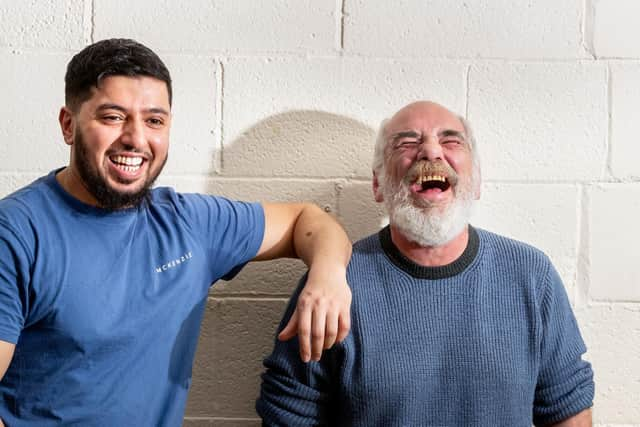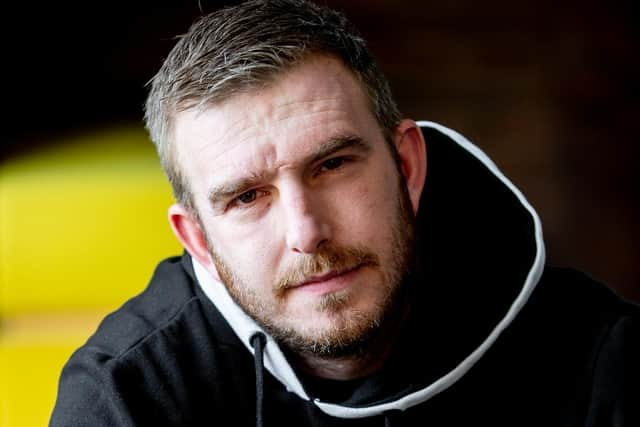'Why it's good to talk': Men share experiences as new campaign to normalise conversations around male suicide and mental health launches in West Yorkshire
“Talking can be a life saver, I think,” Norman Green says. “Talking helps you to process the things going on inside [your mind].”
The 59-year-old from Huddersfield is a volunteer for Community Links, a non-profit provider of health and social care services in Yorkshire, including in Kirklees.
Advertisement
Hide AdAdvertisement
Hide AdIt helped him, he says, after he was diagnosed with Post-Traumatic Stress Disorder (PTSD), after being hit by a car and seriously injured in an incident in Lanzarote nearly 12 years ago.


“After I had a second operation to put my pelvis back together, I got diagnosed with PTSD and I ended up ringing up the Samaritans one night because I was close to suicide,” he recalls.
His doctor helped him to access mental health support and also put him in contact with Community Links, which Norman says “really helped to get me back on my feet”.
He’s since supported the organisation, first helping to run a series of men’s groups , designed to encourage people to check in on each other and talk about their mental health and wellbeing, and now volunteering with its Men’s Talk project, a performance and advocacy scheme for men who have experienced mental health issues.
Advertisement
Hide AdAdvertisement
Hide Ad

“Talking about things, getting them out in the open, rather than sitting at home with things stewing, helps to ease the burden,” Norman says.
Mark Craven agrees. The 52-year-old from Batley has been supported by the Community Links Engagement and Recovery (CLEAR) service, which helps individuals with mental health needs to develop confidence, motivation and self-reliance through social, leisure and skills-based activities.
“Anybody with issues like we all have, we have a [shared] understanding,” he says. “When you talk to people who haven’t been through things with their mental health, they can look at you daft.
“We might not be going through everything together, we might not have the same problems but we do have issues and we try to share those and help and support each other and it really does work.
Advertisement
Hide AdAdvertisement
Hide Ad“You’re getting out and regularly seeing people and know you aren’t going to have the mickey taken out of you for the way you feel. It really is helpful.”
Mark has previously planned to take his own life and says CLEAR has helped him to “turn things around”. He is now training to be a facilitator for the service.
“I’m going through a good time at the moment but I know I could wake up tomorrow and be back in a bad time,” Mark says. “But I know I’ve got people who I can rely on, who understand.”
“There’s no trigger in it for me,” he adds. “I can just flip and think it’s a good idea to take my own life but with the support I’ve got from CLEAR and the services they offer, they’ve helped me turn it around.
Advertisement
Hide AdAdvertisement
Hide Ad“I think it’s time to give something back. If I can just change one bloke’s mind to not take his own life, I think I’ve done a good job.”
Stuart Hawkes, an engagement and development worker at Community Links, explains why working with men is important.
He says: “75 per cent of suicides involve men and yet take up by men of services isn’t as high as we’d like. We know statistically that when men do get involved in services, their risk of suicide drops significantly.”
The Office for National Statistics data shows that suicide is more common in West Yorkshire than in England as a whole, with significantly more men taking their own lives than women. The data shows that there were 235 deaths registered by coroners as suicides in West Yorkshire in 2020, with an average of 4.5 people per week.
Advertisement
Hide AdAdvertisement
Hide AdThis week, the West Yorkshire Health and Care Partnership has launched a new campaign to create awareness around male suicide in the area. The organisation works in partnership with the NHS, councils, and charities to improve the health and wellbeing of local people.
The campaign aims to normalise conversations around suicide and mental health. Developed with local men and built from their experiences, it features a package of resources including posters and social media images which aim to encourage people to check in on others, as well as information to signpost people to support services.
It builds on the partnership’s award-winning staff suicide prevention campaign ‘Check-In’. Jessica Parker, project manager for the partnership’s suicide prevention programme, believes the campaign could save lives.
"We all have a part to play in combatting stigma and identifying men in our lives who are going through struggles and asking them if they need help,” Jess says.
Advertisement
Hide AdAdvertisement
Hide AdSurinder Rall, service lead for West Yorkshire Suicide Bereavement Service, says it is essential that people know the warning signs of suicide.
“I lost both my father and my uncle to suicide,” Surinder says. “So, I speak from experience when I say that we should all work together to combat the stigma and talk more about suicide. To achieve our target of zero suicides in West Yorkshire, we must continue to talk and ask each other about mental health and suicide.”
Campaign resources are available at staffcheck-in.co.uk/campaign-toolkit/males/
Suicide prevention information is also available at suicidepreventionwestyorkshire.co.uk and zerosuicidealliance.com
